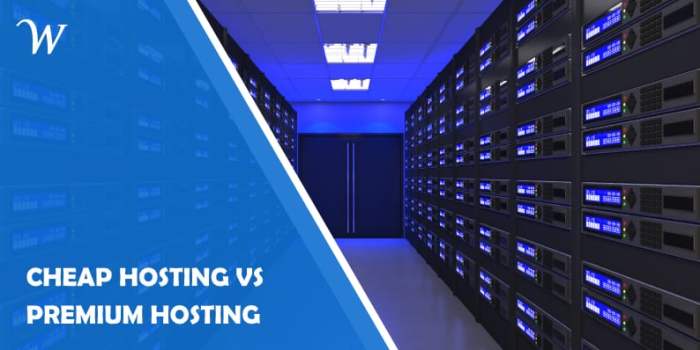Cheap vs. Premium Web Hosting: Which Is Worth Your Money? The choice between a budget-friendly web hosting plan and a premium one can feel overwhelming, especially when you’re just starting out. Both options have their own advantages and drawbacks, and the best choice ultimately depends on your individual needs and priorities.
Understanding the basics of web hosting, including the different types like shared, VPS, dedicated, and cloud, is crucial for making an informed decision. We’ll delve into the pros and cons of both cheap and premium web hosting, highlighting factors like storage space, bandwidth, security, and performance. Ultimately, we’ll help you determine which type of hosting aligns best with your website’s requirements and your budget.
Understanding Web Hosting Basics

Before diving into the comparison of cheap and premium web hosting, let’s first understand the fundamental concepts of web hosting. Essentially, web hosting is the service that allows you to make your website accessible on the internet. When you create a website, you need a server to store all your website files, and web hosting providers offer this service.
Types of Web Hosting, Cheap vs. Premium Web Hosting: Which Is Worth Your Money?
There are various types of web hosting, each with its own set of features and pricing. Choosing the right type depends on your website’s needs, traffic volume, and budget.
- Shared Hosting: This is the most affordable option, where multiple websites share the same server resources. Shared hosting is suitable for small websites with low traffic volumes, as it offers basic features at an economical price.
- VPS Hosting: Virtual Private Server (VPS) hosting provides a virtualized environment, offering more resources and control than shared hosting. VPS is a good choice for websites with moderate traffic and those requiring more security and performance.
- Dedicated Hosting: Dedicated hosting provides an entire server exclusively for your website. This option offers maximum performance, security, and control, but it comes at a higher price. Dedicated hosting is suitable for large websites with high traffic volumes and demanding applications.
- Cloud Hosting: Cloud hosting utilizes a network of servers to distribute your website’s workload. This offers scalability, reliability, and flexibility, as you can adjust resources on demand. Cloud hosting is suitable for websites with fluctuating traffic and those requiring high availability.
Essential Features of Web Hosting
Besides the type of hosting, there are several essential features to consider when choosing a web hosting provider.
- Storage Space: This refers to the amount of disk space allocated to your website for storing files, images, and other data. The required storage space depends on your website’s content and size.
- Bandwidth: Bandwidth represents the amount of data that can be transferred to and from your website per unit of time. Websites with high traffic require more bandwidth to handle the data transfer.
- Security: Security features are crucial to protect your website from attacks and data breaches. Look for providers offering firewalls, malware protection, and regular backups.
- Performance: Website performance is critical for user experience and search engine ranking. Choose a provider with fast servers, reliable network infrastructure, and optimization tools.
- Support: Having access to reliable customer support is essential, especially when encountering technical issues. Consider providers offering 24/7 support, multiple communication channels, and helpful resources.
Cheap Web Hosting
Cheap web hosting is a popular option for individuals and small businesses seeking an affordable way to establish an online presence. It offers several advantages, such as cost-effectiveness and ease of use. However, it’s essential to be aware of potential drawbacks before making a decision.
Advantages of Cheap Web Hosting
Cheap web hosting can be an attractive option for those with limited budgets. The most significant advantage is its affordability, making it accessible to individuals and small businesses. Additionally, many cheap hosting providers offer user-friendly control panels and intuitive interfaces, simplifying website management for beginners.
Disadvantages of Cheap Web Hosting
While cheap web hosting offers affordability, it often comes with limitations. The most common drawback is the limited resources provided, such as storage space, bandwidth, and processing power. This can lead to performance issues, including slow loading times and website crashes, particularly during peak traffic hours. Furthermore, cheap web hosting providers may offer minimal customer support. This can be frustrating for users encountering technical difficulties or needing assistance with website setup or maintenance.
The level of customer support can vary significantly, with some providers offering only basic email or ticketing support, while others may provide 24/7 phone or live chat support.
It is crucial to carefully consider the specific features and limitations of each cheap hosting provider before making a decision.
Premium Web Hosting: Cheap Vs. Premium Web Hosting: Which Is Worth Your Money?

Premium web hosting is designed for businesses and individuals who need more resources and advanced features than what cheap web hosting offers. It provides a higher level of performance, reliability, and security, which can be crucial for websites that experience high traffic or handle sensitive data.
Benefits of Premium Web Hosting
Premium web hosting offers several advantages that can significantly improve your website’s performance, reliability, and security.
- Enhanced Performance: Premium web hosting plans typically come with faster processors, more RAM, and SSD storage, which can significantly improve your website’s loading speed. Faster loading times can lead to a better user experience, higher search engine rankings, and increased conversions.
- Increased Reliability: Premium web hosting providers often offer higher uptime guarantees, which means your website is less likely to experience downtime. They also have more robust infrastructure and redundancy measures in place to prevent outages.
- Advanced Features: Premium web hosting plans often include advanced features such as daily backups, website staging environments, and access to a dedicated support team. These features can save you time and effort while providing peace of mind.
- Enhanced Security: Premium web hosting providers often have more robust security measures in place, such as firewalls, malware scanning, and DDoS protection. This can help protect your website from attacks and keep your data safe.
Potential Downsides of Premium Web Hosting
While premium web hosting offers many advantages, it also comes with some potential downsides.
- Higher Cost: Premium web hosting plans are typically more expensive than cheap web hosting plans. The cost difference can be significant, especially if you are on a tight budget.
- More Complex Setup: Premium web hosting plans may require more technical expertise to set up and manage. You may need to be familiar with concepts such as DNS records, FTP clients, and SSH access.
Key Considerations for Choosing Web Hosting

Choosing the right web hosting plan is crucial for your website’s success. It’s not just about finding the cheapest option; you need to consider various factors that align with your website’s needs and your budget.
Comparing Features and Pricing
This table highlights key features and pricing differences between cheap and premium web hosting providers:
| Feature | Cheap Web Hosting | Premium Web Hosting |
|---|---|---|
| Price | Starts from $1-$5 per month | Starts from $10-$50 per month |
| Storage Space | Limited, usually 1-10 GB | Generous, often 50 GB or more |
| Bandwidth | Limited, often capped at a certain amount | Unlimited or very high bandwidth |
| Security Features | Basic security features | Advanced security features, including SSL certificates, firewalls, and malware protection |
| Customer Support | Limited or email-only support | 24/7 support via phone, email, and live chat |
| Performance | Slower speeds, especially during peak traffic | Faster speeds and reliable performance |
| Scalability | Limited scalability options | Easy to scale resources as your website grows |
| Features | Basic features, often with limited functionality | Advanced features, including email accounts, databases, and website builders |
Factors to Consider When Choosing Web Hosting
Choosing the right web hosting plan involves evaluating several factors.
- Website Traffic: If you anticipate high website traffic, a premium plan with ample bandwidth and storage is essential to avoid performance issues. For example, a website selling popular products online will likely need a more robust hosting plan compared to a personal blog with limited traffic.
- Budget: While premium hosting offers superior features, it comes at a higher cost. Evaluate your budget and choose a plan that provides the necessary features without straining your finances. A good strategy is to start with a cheap plan and upgrade as your website grows.
- Scalability: Consider your website’s future growth. A premium hosting plan allows you to easily scale resources as your website gains popularity. This avoids the need for frequent migrations and ensures seamless performance. For example, if you’re launching an e-commerce store, you’ll need a plan that can handle the potential surge in traffic and transactions.
- Technical Expertise: Evaluate your technical skills. If you’re comfortable managing server configurations and security, a cheaper plan with basic features might suffice. However, if you lack technical expertise, a premium plan with robust support and advanced features might be more beneficial.
Best Practices for Web Hosting Optimization
Optimizing your website for performance is crucial regardless of your hosting type. Whether you’re on a budget-friendly shared hosting plan or a premium dedicated server, implementing best practices can significantly enhance user experience and boost your website’s overall success.
Content Optimization
Content optimization is the foundation of a fast and efficient website. It involves streamlining your website’s content to ensure it loads quickly and efficiently.
- Minimize HTML, CSS, and JavaScript: Reducing the size of these files can drastically improve loading times. Use tools like Google PageSpeed Insights to identify areas for improvement.
- Compress Images: Images often account for a significant portion of website size. Compressing images without compromising quality can significantly reduce loading times. Tools like TinyPNG and Optimizilla are excellent for this purpose.
- Optimize Fonts: Using web-safe fonts or minimizing the number of fonts can improve loading speeds. Consider using a font optimization service like Font Awesome or Google Fonts.
- Lazy Loading: Implement lazy loading for images, especially large ones, to improve initial page load time. Lazy loading loads images only when they are visible in the user’s viewport.
Caching
Caching is a powerful technique that stores copies of frequently accessed website content on the user’s browser or server. This reduces the need to fetch data from the server every time a user visits a page, resulting in faster load times.
- Browser Caching: Configure your website to leverage browser caching. This allows users to store static files like CSS and JavaScript locally, leading to faster subsequent visits.
- Server-Side Caching: Implement server-side caching using tools like Memcached or Redis. This caches dynamic content, such as database queries, for faster retrieval.
- Content Delivery Networks (CDNs): CDNs distribute your website’s content across multiple servers globally.
This brings content closer to users, reducing latency and improving load times.
Security Measures
Securing your website is paramount, regardless of your hosting plan. Implementing robust security measures protects your website from attacks and safeguards your data.
- SSL Certificates: An SSL certificate encrypts communication between your website and users, ensuring secure data transmission. This is essential for building trust and protecting sensitive information.
- Firewalls: Firewalls act as a barrier between your website and the internet, blocking unauthorized access and malicious traffic. They are crucial for protecting against common attacks like SQL injection and cross-site scripting (XSS).
- Regular Updates: Keep your website’s software, including the operating system, web server, and plugins, up to date.
Updates often include security patches that fix vulnerabilities and enhance protection.
- Strong Passwords: Use strong, unique passwords for your website’s administrative accounts and avoid using default credentials.
Choosing the right web hosting solution is a key step in building a successful online presence. Whether you opt for a cost-effective cheap plan or invest in the enhanced features and reliability of premium hosting, understanding your needs and making a well-informed decision is essential. By carefully considering factors like traffic volume, budget, scalability, and technical expertise, you can choose the web hosting solution that best supports your website’s growth and success.
Essential FAQs
What is the difference between shared, VPS, dedicated, and cloud hosting?
Shared hosting is the most affordable option where multiple websites share the same server resources. VPS hosting offers more resources and control, while dedicated hosting provides a dedicated server for your website. Cloud hosting utilizes a network of servers for scalability and reliability.
How much bandwidth do I need for my website?
Bandwidth refers to the amount of data that can be transferred to and from your website. The amount you need depends on your website’s traffic volume and the types of content you host.
What are some common security measures for web hosting?
Common security measures include SSL certificates for encryption, firewalls to prevent unauthorized access, and regular security updates to protect against vulnerabilities.
What are some tips for optimizing website performance?
Tips for optimizing website performance include content optimization, caching to store frequently accessed data, and image optimization to reduce file sizes.